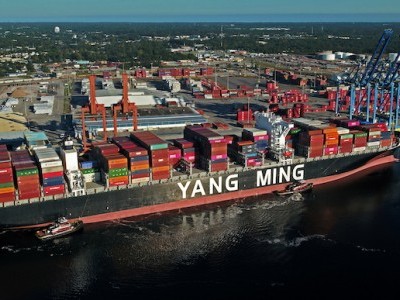Naval Dome opens US cyber hub
Sep 10, 2020As part of wider expansion plans, maritime cyber security systems pioneer Naval Dome has established a significant presence in the Americas with the opening of a new product development and customer service centre in Boston, Massachusetts.
The opening of the 12,000ft2 facility in Cambridge, a Boston suburb, coincides with the appointment of an expanded leadership team selected to drive forward the company’s ambitious growth strategy.
Naval Dome President and CEO Itai Sela said: “Since the company was established in 2016, we have gained considerable traction across the maritime and port industries, resulting in a need to expand into new geographical areas to support and service our customers’ requirements. We have also made a number of senior executive appointments in what marks the beginning of the next stage of our growth strategy.”
The Boston facility, led by Naval Dome’s newly appointed Head of North America Operations, Robert Rizika, will be manned 24/7 to provide global, single-point support to those rig, ship and port operators with assets protected by Naval Dome. The hub will also house an R&D centre to monitor emergent cyber threats and to develop core software and new solutions.
“We believe it is vitally important to the ongoing development of maritime cyber security, globally, that we have a presence in North America,” said Rizika. “We see substantial growth for all our cyber security products across the region.
“A physical presence here not only strengthens Naval Dome’s global position, but it also allows us to combine the ground-breaking technical innovation from Israel with that developed here in the United States.”
While there has been an increase in the number of operators globally investing in Naval Dome cyber security systems, Rizika said that given the sheer volume of legacy equipment still in operation, there is a large cyber security hole which asset owners need to address as quickly as possible.
“The number of maritime systems operating on Windows XP, Windows 7, and older versions of Linux all of which were designed at a time when cyber security was not an issue, is a significant cyber challenge for OEMs and operators alike,” he said.
“We call it the ‘Legacy Dilemma’. A drilling rig or fleet of ships may have several different systems installed, supplied by several different manufacturers, and all running different operating systems. The OEM of course wants to upgrade them to a new system, but the operator is reluctant to make that level of fleet-wide investment, especially in the current economic climate.”
Ram Krishnan, recently appointed as CTO, said: “We are working with a number of parties to protect older systems, but there is still a vast amount of 20th Century equipment in use that is poorly equipped to deal with a 21st Century cyber attack. We have a solution capable of protecting and monitoring all legacy systems operating in heterogeneous environments, irrespective of type, vendor or operating system.”
The solution to which Krishnan refers is TAS1000, a maritime security solution designed specifically to meet maritime industry demand for remotely-installed protection with a dashboard that provides a complete, fleet-wide single-pane view of each system’s cyber events, logs, alerts, attack vectors, and locations.
“We believe we are the only company to have this capability,” said Krishnan.
Trevor Keith, Vice President Product Management, added: “The development of TAS1000 is reflective of the success of the Boston office and the strong cooperation between our technology leaders in Israel and the US. We are now looking to emulate this success with new solutions and new facilities in Houston, Singapore and the Netherlands.”
Naval Dome’s expanded leadership team comprises Itai Sela, Naval Dome President and CEO; Ram Krishnan, CTO; Ido Ben Moshe, Vice President Business Development; Paola Rossi, Vice President Marketing & Sales; Robert Rizika, Head of North American Operations; and Trevor Keith, Vice President, Product Management.
Similar Stories

Hapag-Lloyd WDS/WID surcharge to the U.S. East Coast and Gulf ports
View Article
MSC schedule update – Trade Asia to USA West Coast
View Article
Stena RoRo takes delivery of the battery hybrid vessel Guillaume de Normandie
View Article
Indian Register of Shipping reflects on 2024 and sets ambitious goals for 2025
View Article
Yang Ming announces 2025 Trans-Atlantic services
View Article
Exclusive interview with AWO’s Jennifer Carpenter
View ArticleGet the most up-to-date trending news!
SubscribeIndustry updates and weekly newsletter direct to your inbox!





